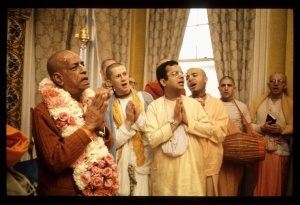CC Madhya 6.87 (1975): Difference between revisions
(Vanibot #0027: CCMirror - Mirror CC's 1996 edition to form a basis for 1975) |
(Vanibot #0020: VersionCompareLinker - added a link to the Version Compare feature) |
||
| Line 2: | Line 2: | ||
<div style="float:left">'''[[Sri Caitanya-caritamrta (1975)|Śrī Caitanya-caritāmṛta (1975)]] - [[CC Madhya (1975)|Madhya-līlā]] - [[CC Madhya 6 (1975)|Chapter 6: The Liberation of Sārvabhauma Bhaṭṭācārya]]'''</div> | <div style="float:left">'''[[Sri Caitanya-caritamrta (1975)|Śrī Caitanya-caritāmṛta (1975)]] - [[CC Madhya (1975)|Madhya-līlā]] - [[CC Madhya 6 (1975)|Chapter 6: The Liberation of Sārvabhauma Bhaṭṭācārya]]'''</div> | ||
<div style="float:right">[[File:Go-previous.png|link=CC Madhya 6.85-86 (1975)|Madhya-līlā 6.85-86]] '''[[CC Madhya 6.85-86 (1975)|Madhya-līlā 6.85-86]] - [[CC Madhya 6.88 (1975)|Madhya-līlā 6.88]]''' [[File:Go-next.png|link=CC Madhya 6.88 (1975)|Madhya-līlā 6.88]]</div> | <div style="float:right">[[File:Go-previous.png|link=CC Madhya 6.85-86 (1975)|Madhya-līlā 6.85-86]] '''[[CC Madhya 6.85-86 (1975)|Madhya-līlā 6.85-86]] - [[CC Madhya 6.88 (1975)|Madhya-līlā 6.88]]''' [[File:Go-next.png|link=CC Madhya 6.88 (1975)|Madhya-līlā 6.88]]</div> | ||
{{CompareVersions|CC|Madhya 6.87|CC 1975|CC 1996}} | |||
{{RandomImage}} | {{RandomImage}} | ||
==== TEXT 87 ==== | ==== TEXT 87 ==== | ||
| Line 11: | Line 10: | ||
<div class="verse"> | <div class="verse"> | ||
:tomāra nāhika doṣa, śāstre ei kahe | :tomāra nāhika doṣa, śāstre ei kahe | ||
:pāṇḍityādye īśvara-tattva-jñāna kabhu | :pāṇḍityādye īśvara-tattva-jñāna kabhu nahe' | ||
</div> | </div> | ||
| Line 25: | Line 24: | ||
<div class="translation"> | <div class="translation"> | ||
"It is not your fault; it is the verdict of the scriptures. You cannot understand the Supreme Personality of Godhead simply by scholarship." | |||
</div> | </div> | ||
| Line 32: | Line 31: | ||
<div class="purport"> | <div class="purport"> | ||
This is a very important verse. Even big scholars cannot understand Kṛṣṇa, yet they dare comment on the Bhagavad-gītā. Reading the Bhagavad-gītā means understanding Kṛṣṇa, yet we actually see many scholars making blunders in trying to understand Kṛṣṇa. Gopīnātha | This is a very important verse. Even big scholars cannot understand Kṛṣṇa, yet they dare comment on the Bhagavad-gītā. Reading the Bhagavad-gītā means understanding Kṛṣṇa, yet we actually see many scholars making blunders in trying to understand Kṛṣṇa. Gopīnātha Ācārya's statement is confirmed in many places in Vedic literature. In the Kaṭha Upaniṣad (1.2.23) it is stated: | ||
:nāyam ātmā pravacanena labhyo | :nāyam ātmā pravacanena labhyo | ||
| Line 46: | Line 45: | ||
:tvādṛṅ no bhūyān naciketaḥ praṣṭā | :tvādṛṅ no bhūyān naciketaḥ praṣṭā | ||
The fact is that the Supreme Personality of Godhead, the Supersoul, cannot be attained simply by explanations, logic and erudite scholarship. One cannot understand Him simply by | The fact is that the Supreme Personality of Godhead, the Supersoul, cannot be attained simply by explanations, logic and erudite scholarship. One cannot understand Him simply by one's brain substance. Even by studying all Vedic literature, one cannot understand the Supreme Lord. However, if one is slightly favored by the mercy of the Lord, if the Lord is pleased, one can understand Him. But who are the candidates eligible to receive the mercy of the Lord? Only the devotees. They alone can understand what is the Supreme Personality of Godhead. The Lord reveals Himself to the sincere devotee when He is pleased with his service: svayam eva sphuraty adaḥ. One should not try to understand the Lord simply from the statements of the Vedas, nor should one uselessly attempt to decry these statements through reasoning and logic. | ||
</div> | </div> | ||
Latest revision as of 19:10, 27 January 2020

A.C. Bhaktivedanta Swami Prabhupada
TEXT 87
- tomāra nāhika doṣa, śāstre ei kahe
- pāṇḍityādye īśvara-tattva-jñāna kabhu nahe'
SYNONYMS
tomāra—your; nāhika—there is not; doṣa—fault; śāstre—the scriptures; ei—this; kahe—mention; pāṇḍitya-ādye—simply by scholarship, etc.; īśvara-tattva-jñāna—knowledge of the principles of the Supreme Personality of Godhead; kabhu—ever; nahe—there is not.
TRANSLATION
"It is not your fault; it is the verdict of the scriptures. You cannot understand the Supreme Personality of Godhead simply by scholarship."
PURPORT
This is a very important verse. Even big scholars cannot understand Kṛṣṇa, yet they dare comment on the Bhagavad-gītā. Reading the Bhagavad-gītā means understanding Kṛṣṇa, yet we actually see many scholars making blunders in trying to understand Kṛṣṇa. Gopīnātha Ācārya's statement is confirmed in many places in Vedic literature. In the Kaṭha Upaniṣad (1.2.23) it is stated:
- nāyam ātmā pravacanena labhyo
- na medhayā na bahunā śrutena
- yam evaiṣa vṛṇute tena labhyas
- tasyaiṣa ātmā vivṛṇute tanūṁ svām
It is also stated in Kaṭha Upaniṣad (1.2.9):
- naiṣā tarkeṇa matir āpaneyā
- proktānyenaiva sujñānāya preṣṭha
- yāṁ tvam āpaḥ satya-dhṛtir batāsi
- tvādṛṅ no bhūyān naciketaḥ praṣṭā
The fact is that the Supreme Personality of Godhead, the Supersoul, cannot be attained simply by explanations, logic and erudite scholarship. One cannot understand Him simply by one's brain substance. Even by studying all Vedic literature, one cannot understand the Supreme Lord. However, if one is slightly favored by the mercy of the Lord, if the Lord is pleased, one can understand Him. But who are the candidates eligible to receive the mercy of the Lord? Only the devotees. They alone can understand what is the Supreme Personality of Godhead. The Lord reveals Himself to the sincere devotee when He is pleased with his service: svayam eva sphuraty adaḥ. One should not try to understand the Lord simply from the statements of the Vedas, nor should one uselessly attempt to decry these statements through reasoning and logic.